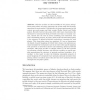66 search results - page 5 / 14 » A Game Theoretical Model for Adversarial Learning |
85
Voted
SLOGICA
2008
14 years 11 months ago
2008
We study a simple game theoretic model of information transfer which we consider to be a baseline model for capturing strategic aspects of epistemological questions. In particular,...
102
Voted
SOFSEM
2010
Springer
15 years 8 months ago
2010
Springer
Regret minimization has proven to be a very powerful tool in both computational learning theory and online algorithms. Regret minimization algorithms can guarantee, for a single de...
104
Voted
RSKT
2009
Springer
15 years 6 months ago
2009
Springer
A game-theoretic approach for learning optimal parameter values for probabilistic rough set regions is presented. The parameters can be used to define approximation regions in a p...
CONCUR
2005
Springer
15 years 5 months ago
2005
Springer
Abstract. Reactive systems are often modelled as two person antagonistic games where one player represents the system while his adversary represents the environment. Undoubtedly, t...
102
click to vote
CEEMAS
2003
Springer
15 years 4 months ago
2003
Springer
Modeling learning agents in the context of Multi-agent Systems requires an adequate understanding of their dynamic behaviour. Usually, these agents are modeled similar to the di�...

